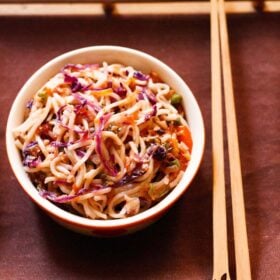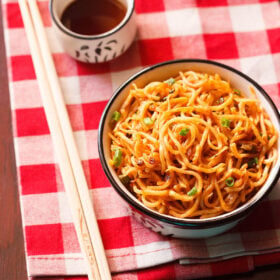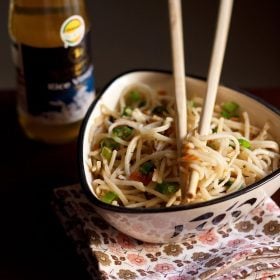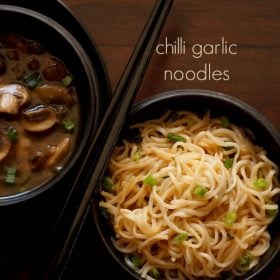The sight of bright red-orangish colored plates of food laced with a topping of chopped spring onions with a side of an extra serving of the fiery Schezwan sauce or chutney is common on streets of India, especially in the metro cities. This is nothing but the scrumptious Chinese Bhel, an adaptation of the American Chopsuey – another fusionized Indo-Chinese preparation made to suit the Indian taste buds. I have shared the easiest way to make a Street Style Chinese Bhel on this post here. It makes for a quick and yummy starter too.
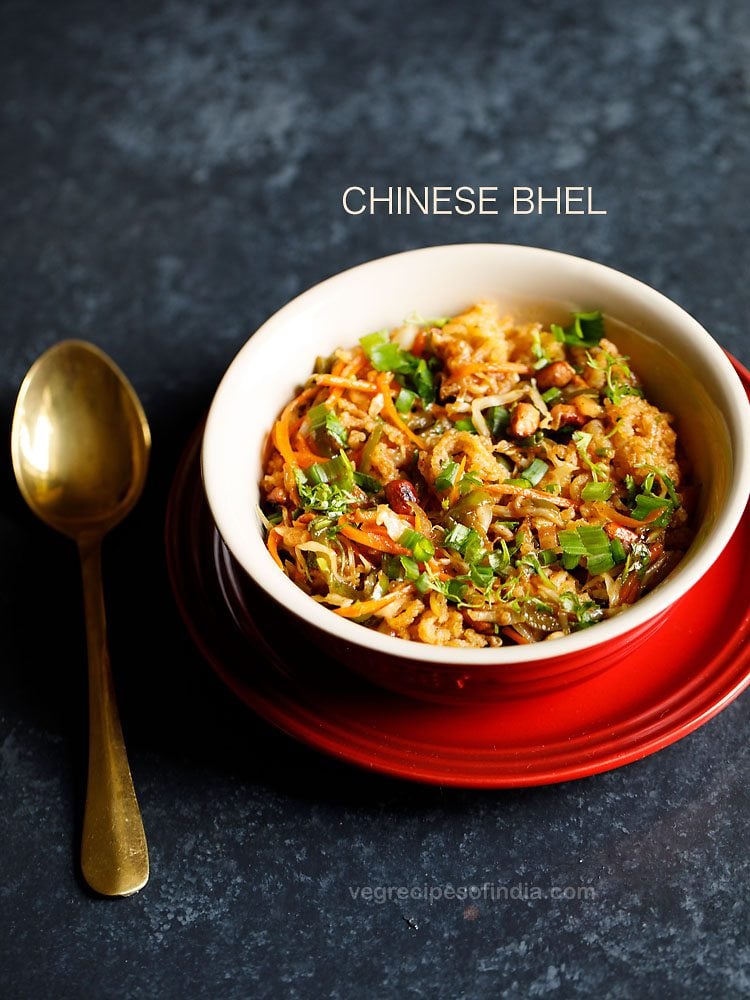
About Chinese Bhel
So basically, the delish union of a Bhel Puri and chopsuey results in a classic Chinese Bhel, a well-known Indo-Chinese style snack from the Indian street food scene. The dish is most popular in Mumbai, Maharashtra, though, street food vendors in other cities too may have their own unique variations.
Given the usual umami sauces and the use of noodles and veggies in it, the recipe of Chinese Bhel also houses sweet, spicy and tangy flavors. You may consider this particular dish as an Indo-Chinese chaat snack too.
It is also a texture-rich preparation, as obvious from the ingredients that go in it. Basically, a really delicious dish, which is apt as a starter for your house parties and get-togethers as well.
In Chinese Bhel, crispy fried noodles are used along with stir fried vegetables and a few sauces. When I make it, I prefer to use sweet tamarind chutney as it gives a really nice sweet and sour taste in the bhel.
One of the main ingredients in a Chinese Bhel is the noodles that are fried and added in the chaat. Use whichever noodles you have – instant, whole wheat, all-purpose flour or Hakka – just make sure to follow my recipe to know the whats and hows to get a batch of perfectly fried noodles.
To make this Indo-Chinese style bhel, you need to use 3 different types of sauces or chutneys – a spicy sauce, a sweet sauce and a tangy or sour sauce. You can even use green chutney, red chili chutney or Schezwan sauce.
For The Perfect Chinese Bhel
The sauces I have used in my recipe of Chinese Bhel are soy sauce (naturally fermented), sweet tamarind chutney and sriracha sauce. Instead of sriracha sauce, you can use red chili sauce or sweet chili sauce.
Instead of sweet tamarind chutney, you can also use tomato ketchup. In fact, you can use a combination of your favorite sauces.
You can add veggies of your choice too. The usual preferred vegetables are cabbage, carrots, baby corn, capsicum (bell pepper) and boiled sweet corn. You can also add some bean sprouts, if you want.
For making Chinese Bhel, noodles are cooked and then deep fried. In this post, I have shared the method of deep frying the noodles. But for a more detailed post, you can refer to this post of How To Make Fried Noodles.
Since cooking and frying takes some time, I fry the noodles a day earlier and keep them stored in an air-tight container. Then, the next day I just need to chop the vegetables and stir fry them. So, less time is consumed. If you use readymade fried noodles, then within 15 to 20 minutes, the Chinese Bhel gets done quickly.
Serve the Chinese Bhel as soon as you assemble it, or else it will turn soggy. While serving, you can garnish it with some chopped coriander leaves, chopped spring onion greens or even both.
How to make Chinese Bhel
Boil Noodles
1. Heat 3 cups water in a sauce pan on medium to high flame. Add ⅓ teaspoon salt.
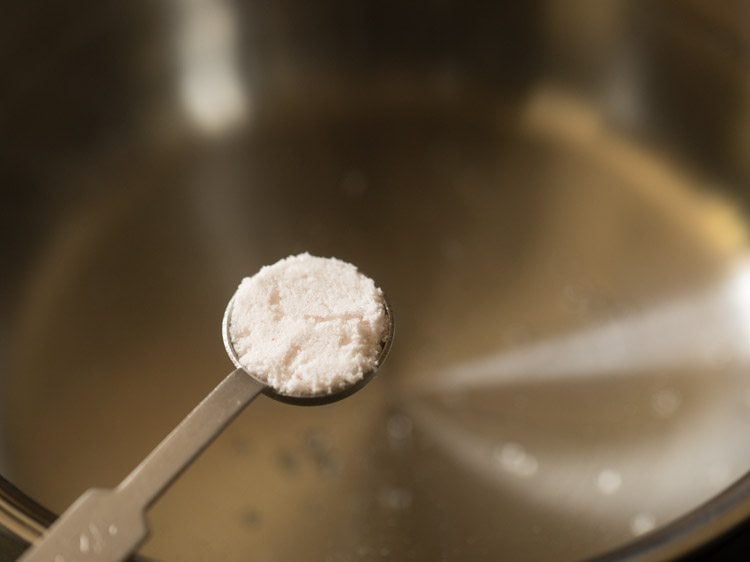
2. Add 2 to 3 drops of oil to the water.
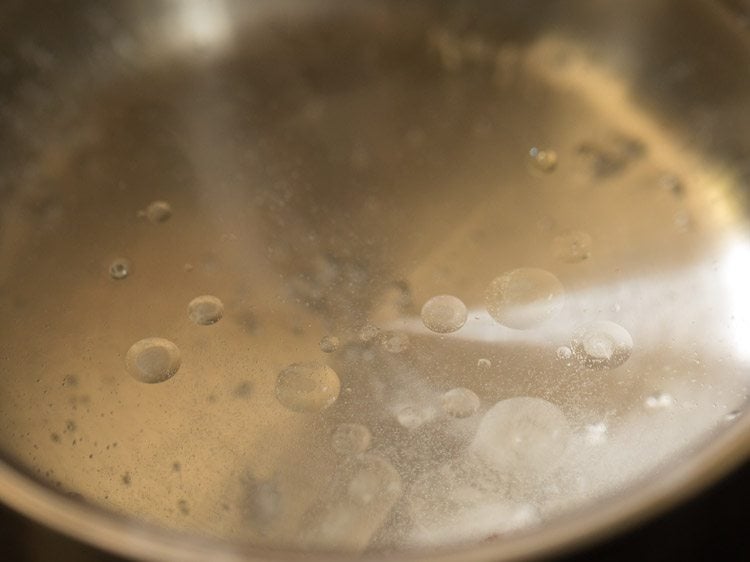
3. Let the water come to a rolling boil.
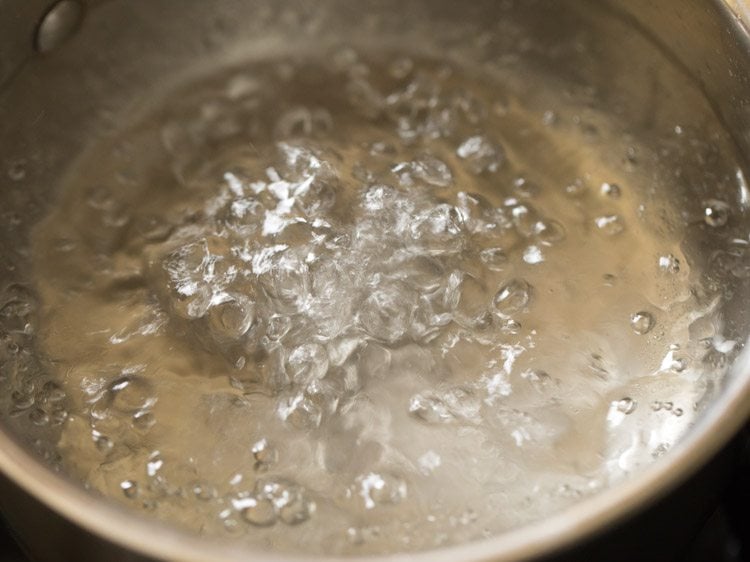
4. Lower heat and add 75 grams noodles. You can use instant, whole wheat, Hakka or all-purpose flour noodles.
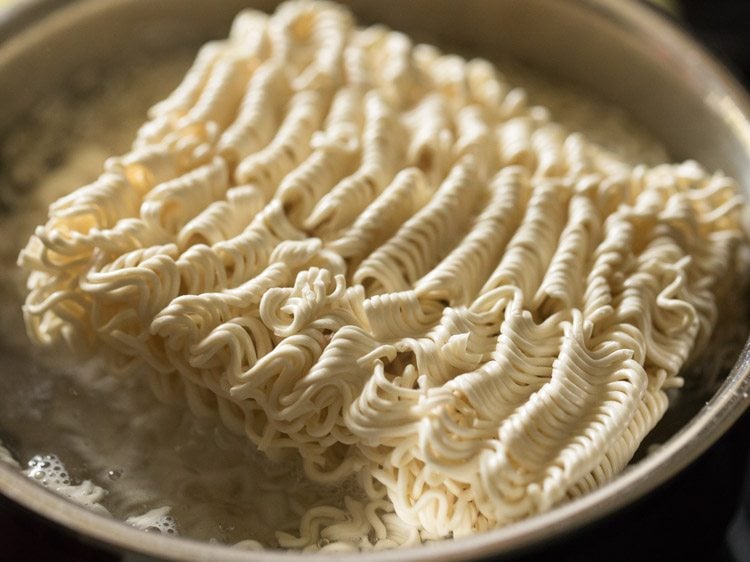
5. With a fork or a spoon, press the noodles in the boiling water.
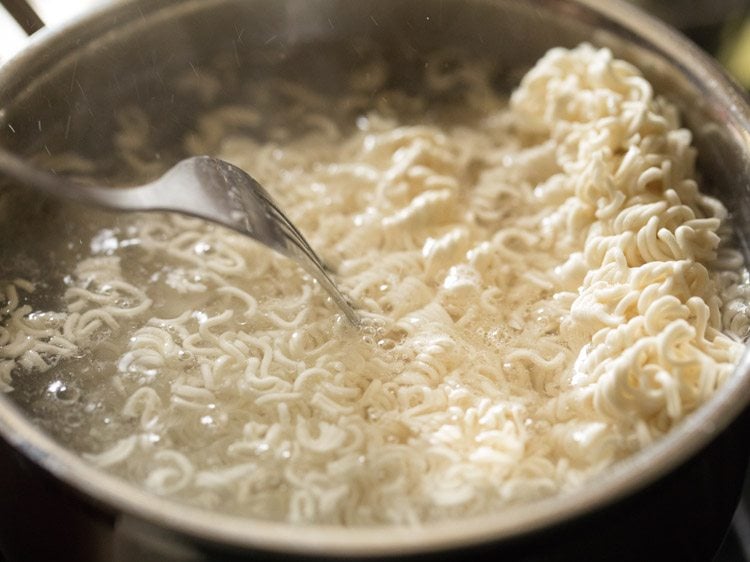
6. Cook noodles on medium heat till they become al dente.
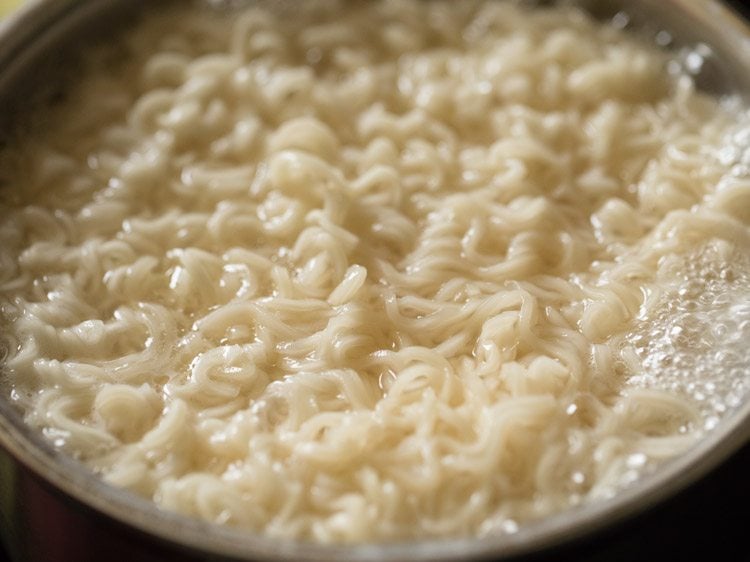
7. Check and taste a few noodle strands and they should have a slight bite to them. They should not be completely cooked.
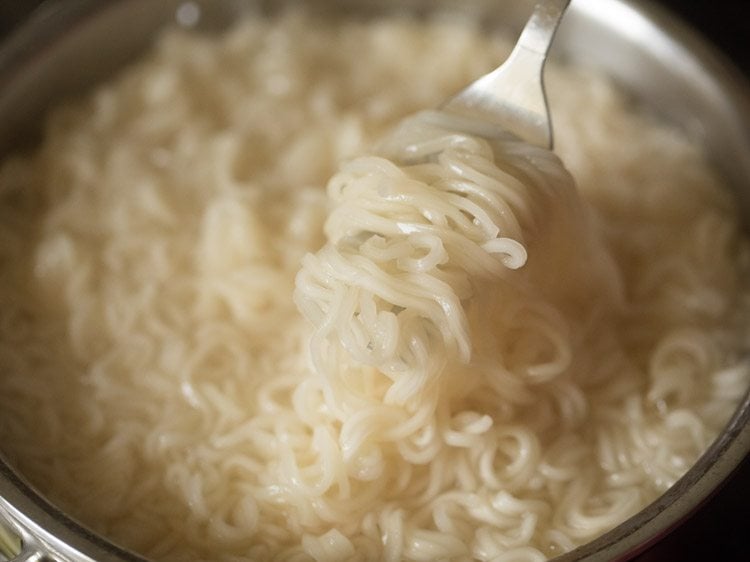
8. Strain the noodles in a colander.
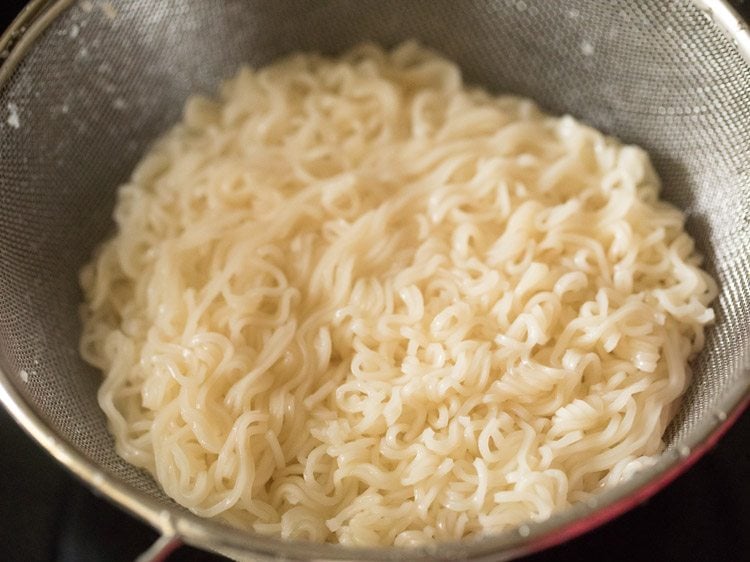
9. Then, rinse the cooked noodles very well with fresh water.
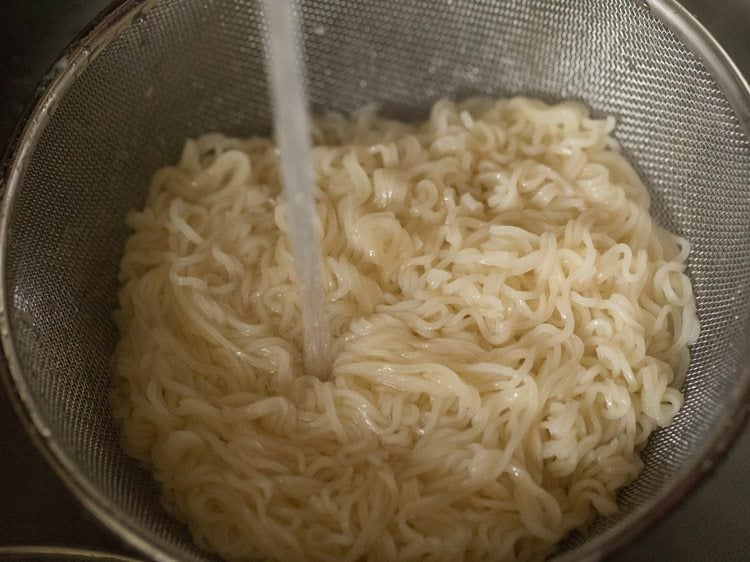
10. Use a spoon to stir when rinsing noodles. Drain any extra or excess water. Remember there should be no water in the rinsed noodles.
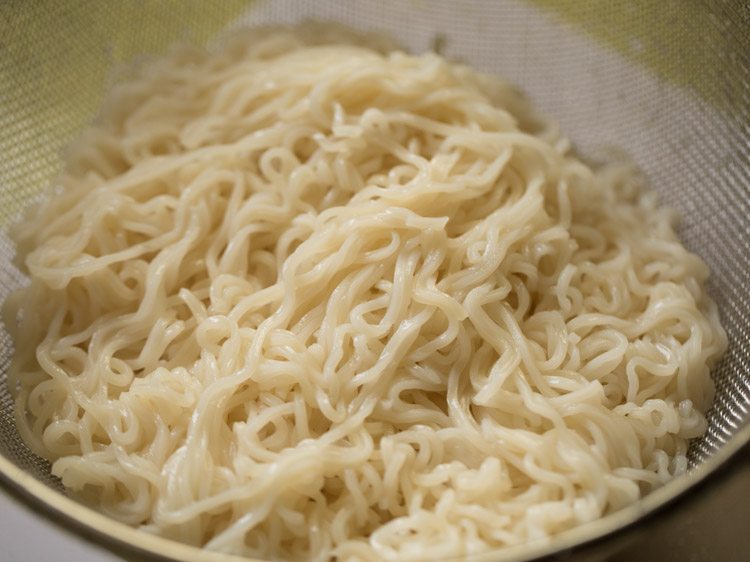
11. Remove the well rinsed noodles on a large plate or tray. Spread them evenly.
Let the noodles cool to room temperature for 1.5 to 2 hours. Later, you can begin to deep fry them.
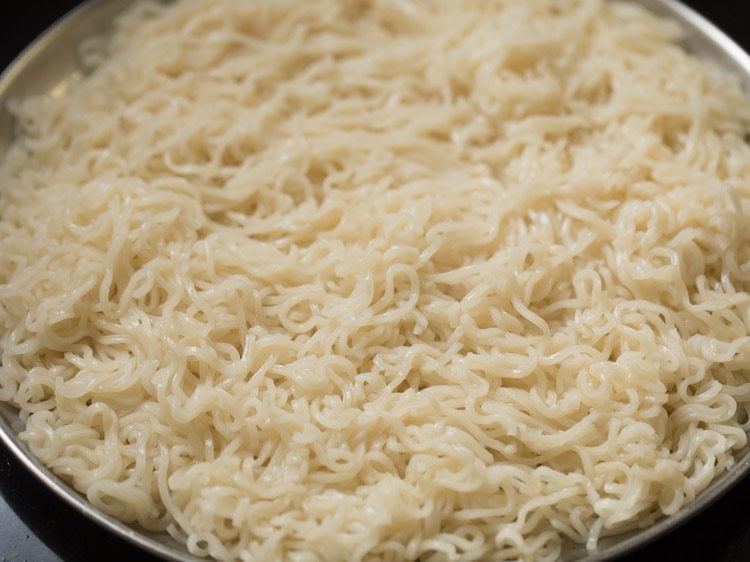
12. Before frying, add 1.5 tablespoons cornstarch (cornflour) on the noodles. This helps in absorbing any moisture from the noodles and also gives a crispy texture after frying.
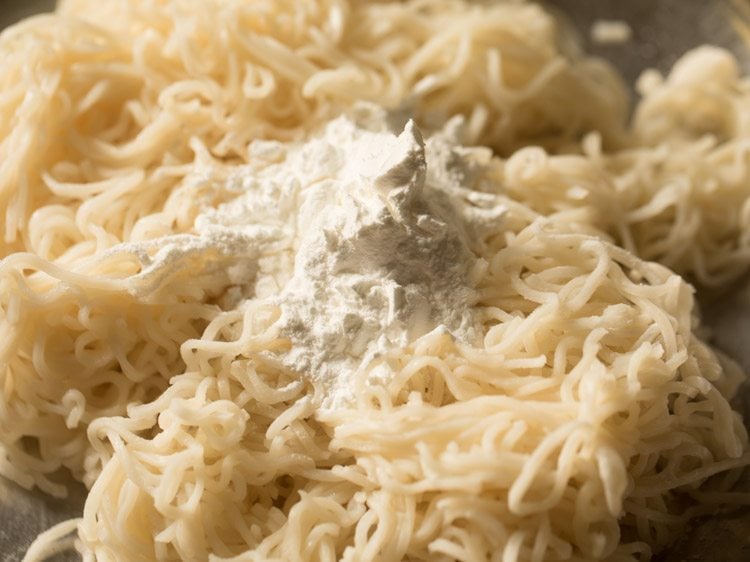
13. Mix very well so that the cornstarch coats the noodles well. You can use a pasta or noodle tong to mix.
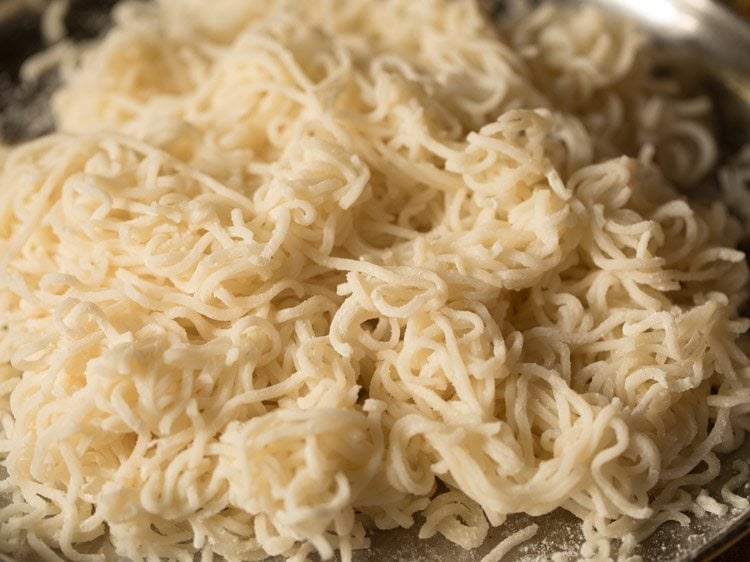
Fry Noodles
14. Heat oil for deep frying in a kadai or a pan. Add a few strands of the noodles and if they come up steadily and gradually, then you can begin to fry them.
In case they settle down at the bottom, the oil needs to get hot. If they come up too quickly then the oil is very hot. So, the heat needs to be reduced.
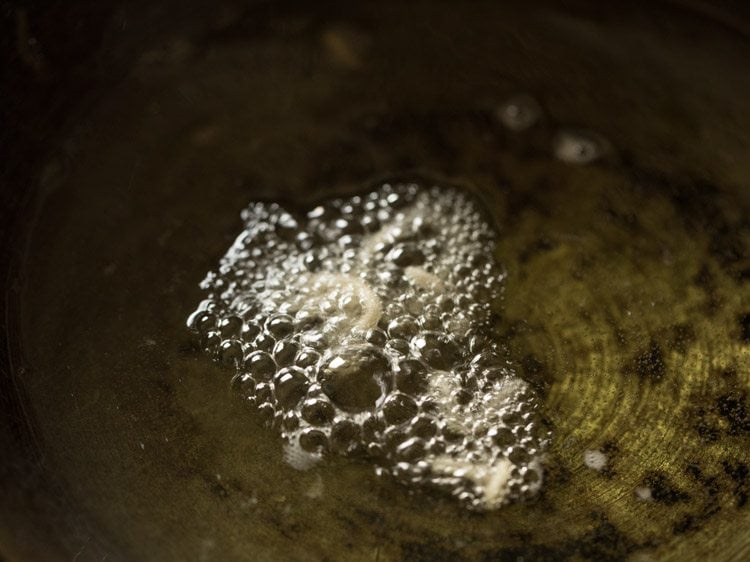
15. Add noodles in batches.
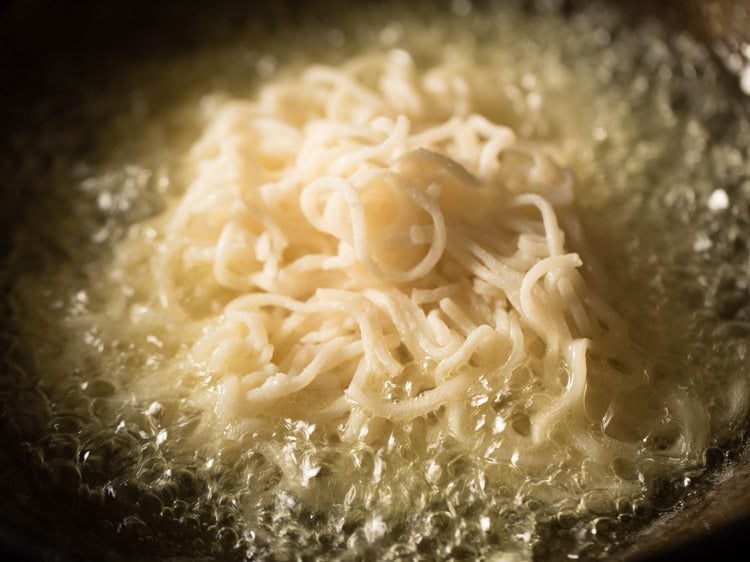
16. As soon as you add noodles, with a slotted spoon, separate them.
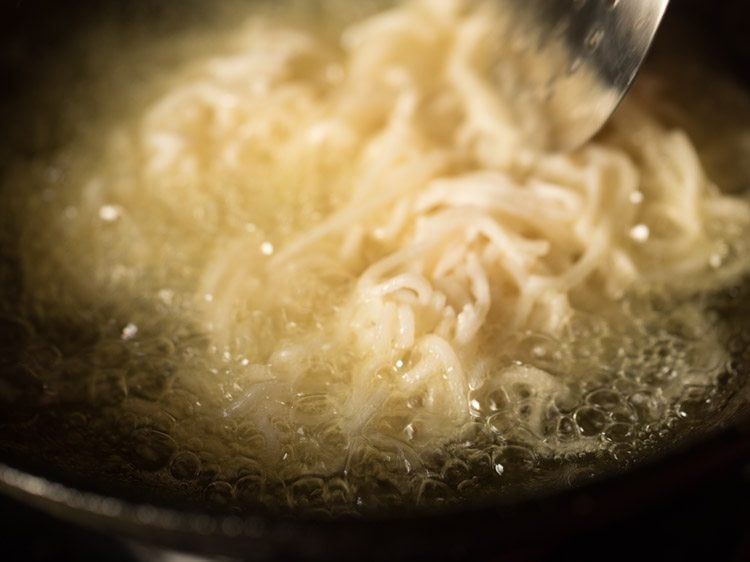
17. Fry till the base becomes light golden and crisp. Then, turn over and fry the second side till crisp and light golden.
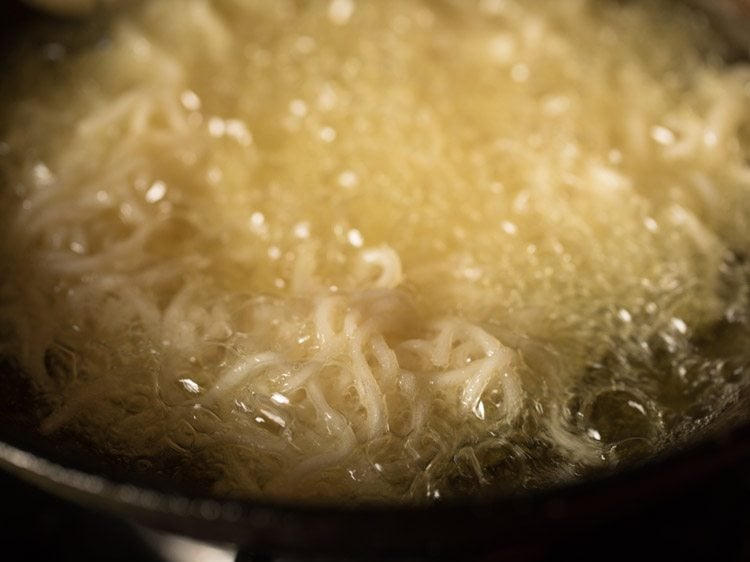
18. Turn over a couple of times and fry till the noodles become golden.
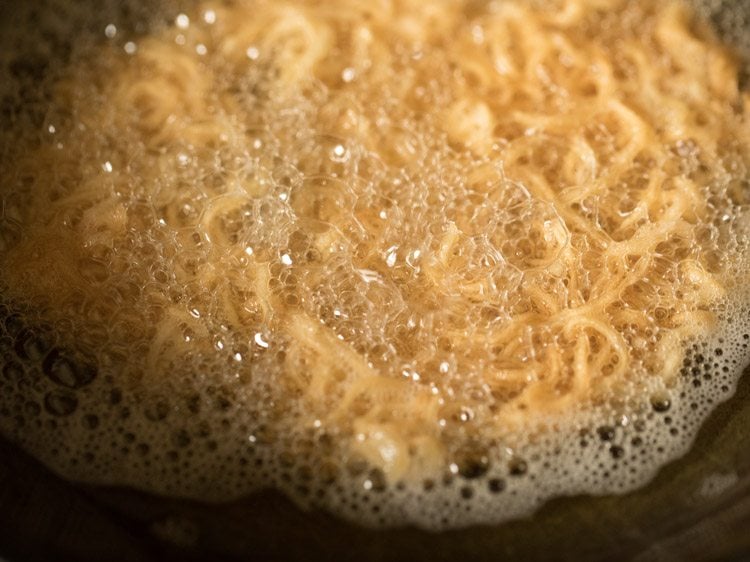
19. Remove fried noodles with a slotted spoon draining excess oil in the kadai or pan.
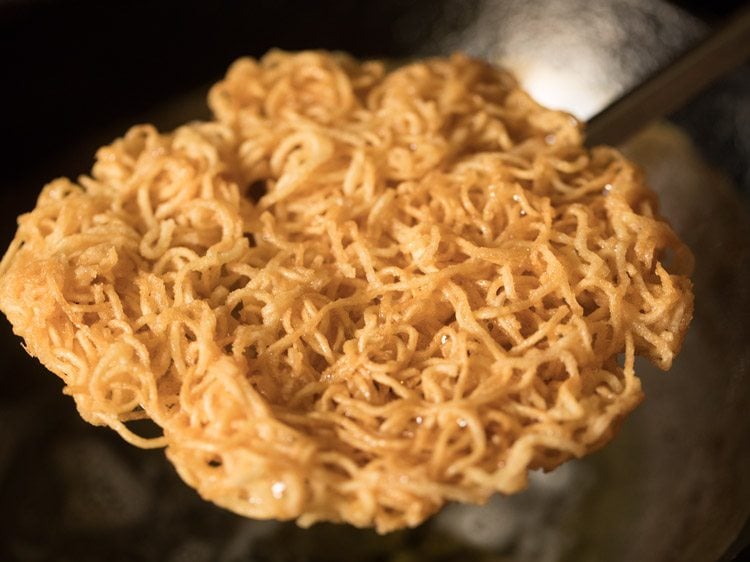
20. Place fried noodles on kitchen paper towel, so that extra oil is absorbed. This way fry the noodles in batches.
Once cooled, place the crispy fried noodles in an air-tight container. You can opt to break these fried noodles once cooled before storing them in an air-tight container or box.
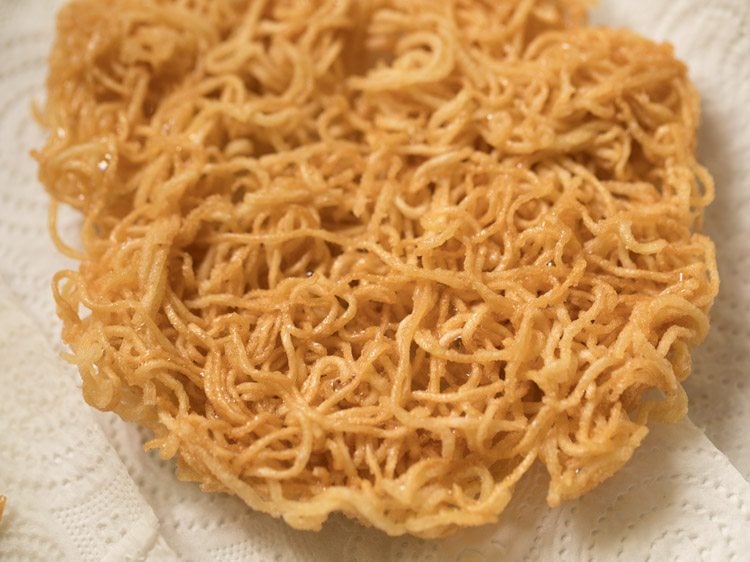
Stir Fry Veggies
21. Shred or finely chop the veggies. You can use a food processor or chop the veggies with a knife.
You will need ½ cup shredded cabbage, ⅓ cup shredded carrots, ⅓ cup thinly sliced capsicum and ¼ cup chopped spring onions.
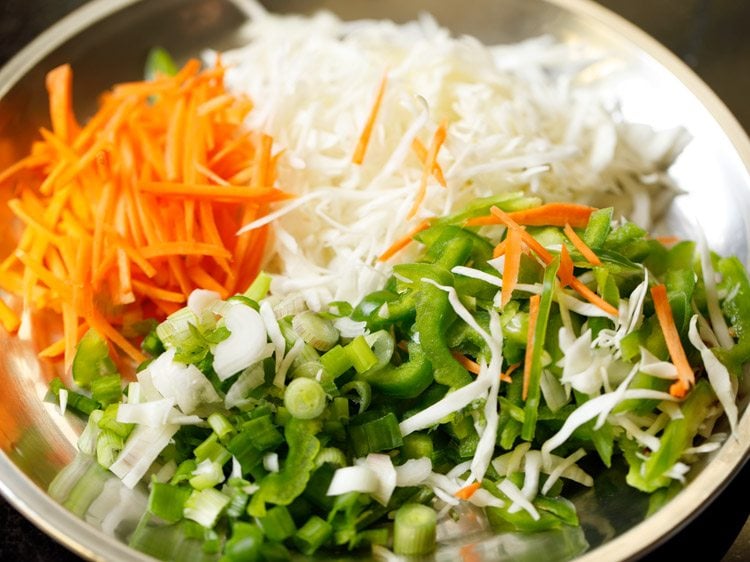
22. Heat 2 teaspoons oil in a small wok or pan. Keep heat to low to medium. Add ¼ cup chopped spring onions.
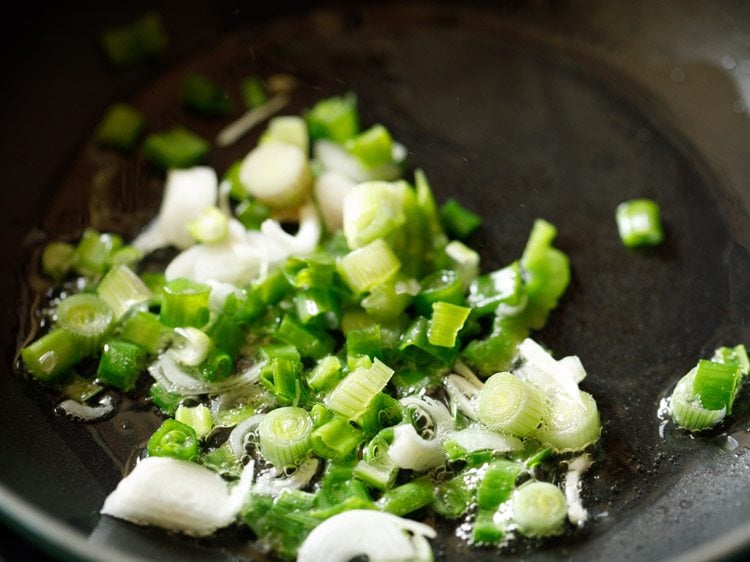
23. Sauté for a minute.
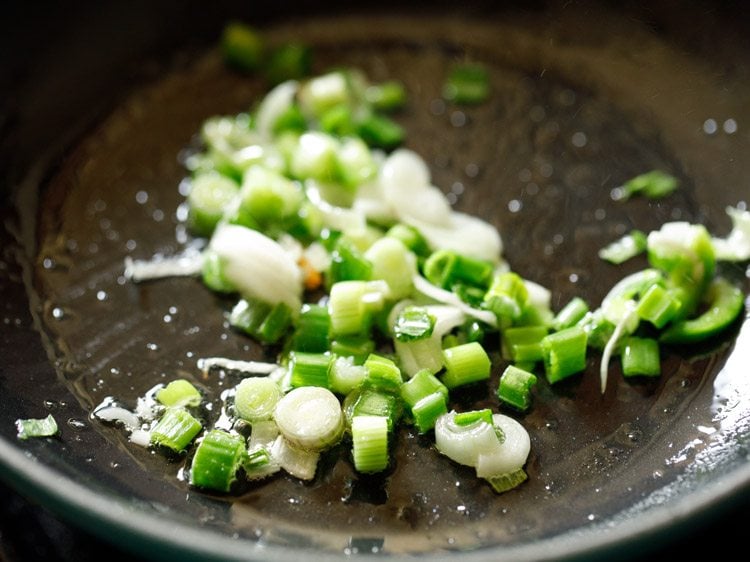
24. Then, add ½ cup shredded cabbage, ⅓ cup shredded carrots and ⅓ cup thinly sliced capsicum. Mix well.
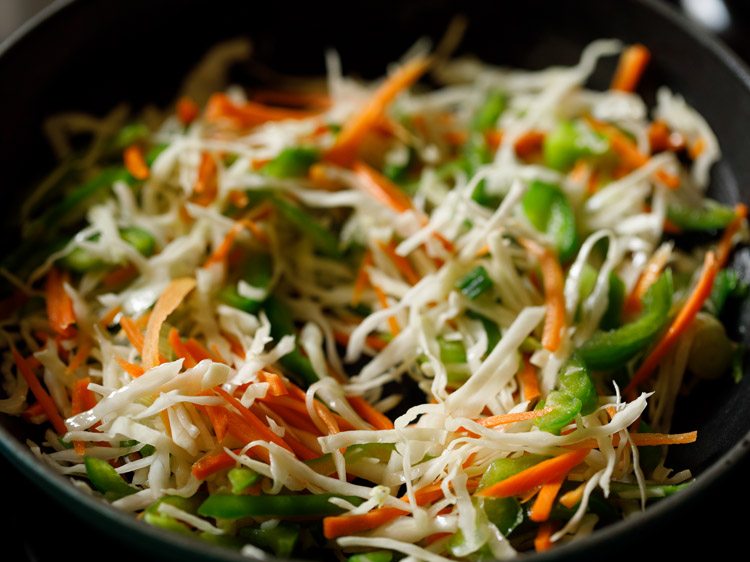
25. Stir fry on medium to high heat for 4 to 5 minutes. Make sure not to overcook the vegetables and a slight bite in them is preferable.
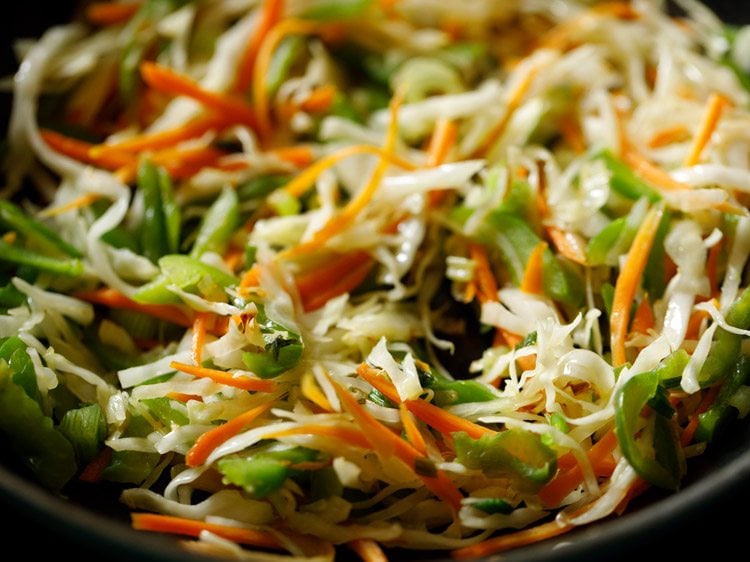
26. Lower the heat and add 1 tablespoon sriracha sauce (or red chili sauce or green chili sauce), 2 tablespoons Sweet Tamarind Chutney (or Tomato Ketchup) and ½ tablespoon soy sauce (naturally fermented).
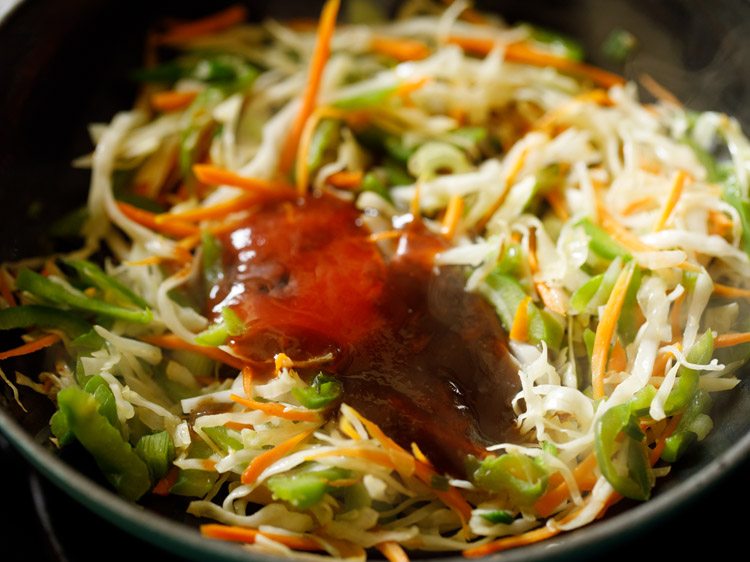
27. Mix very well.
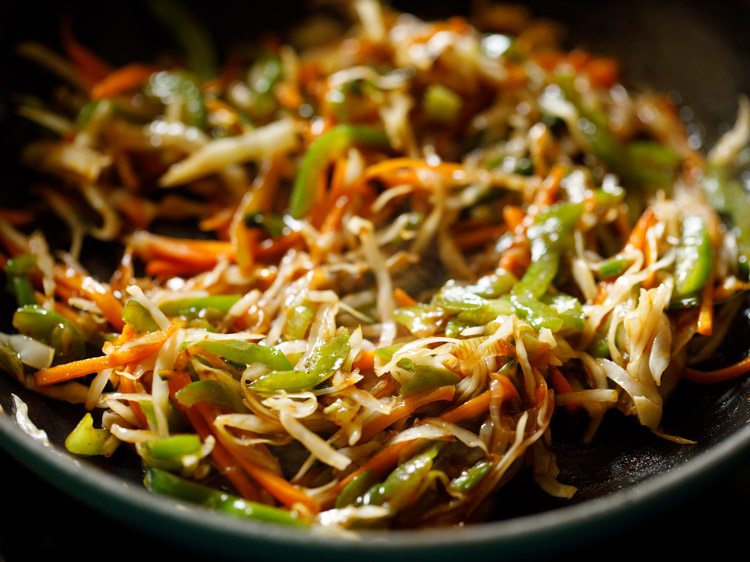
28. Season with ¼ teaspoon black pepper powder and salt as per taste.
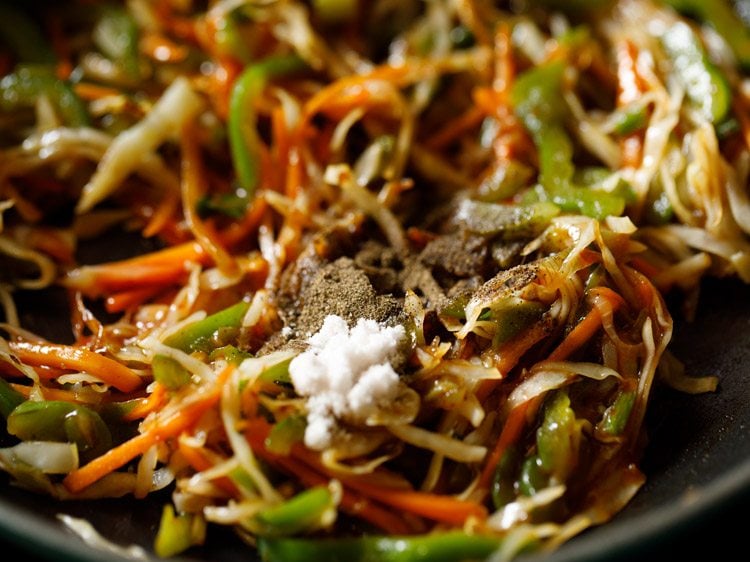
29. Mix very well and switch off the heat.
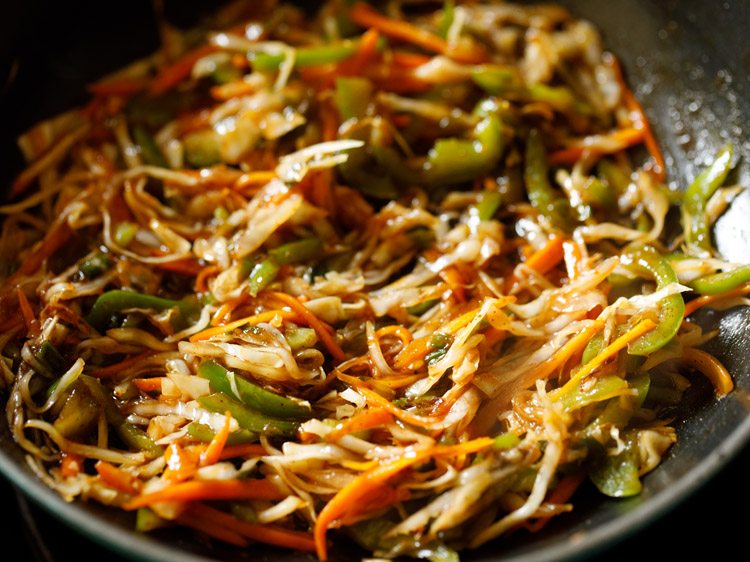
30. Add 2 tablespoons chopped spring onion greens.
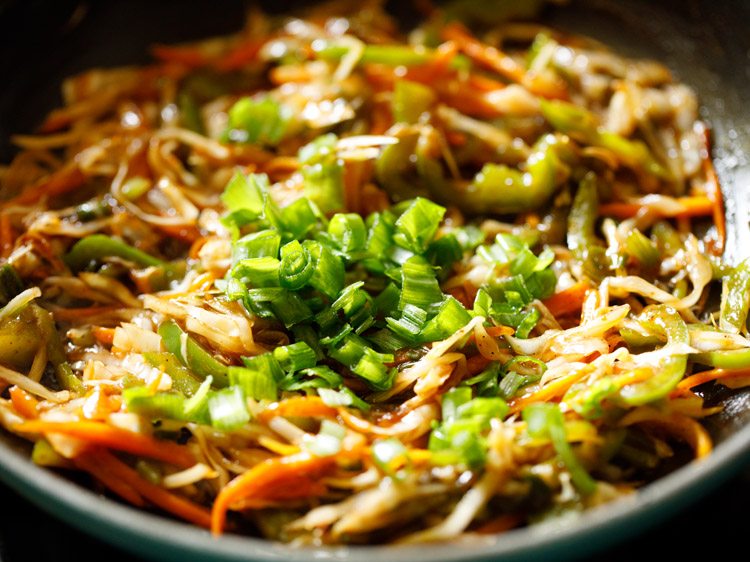
31. Mix again. Check the taste and add more of the sauces and seasonings if needed.
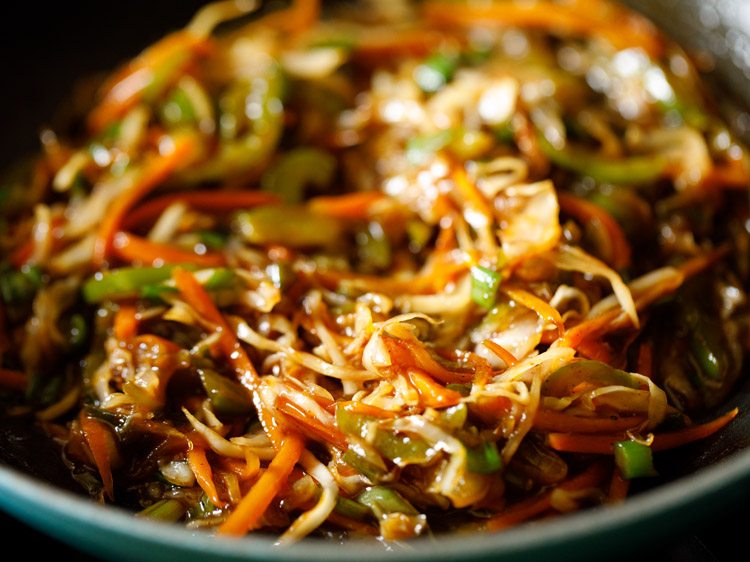
Assemble and Make Chinese Bhel
32. In a mixing bowl, take the fried noodles. Break the noodles.
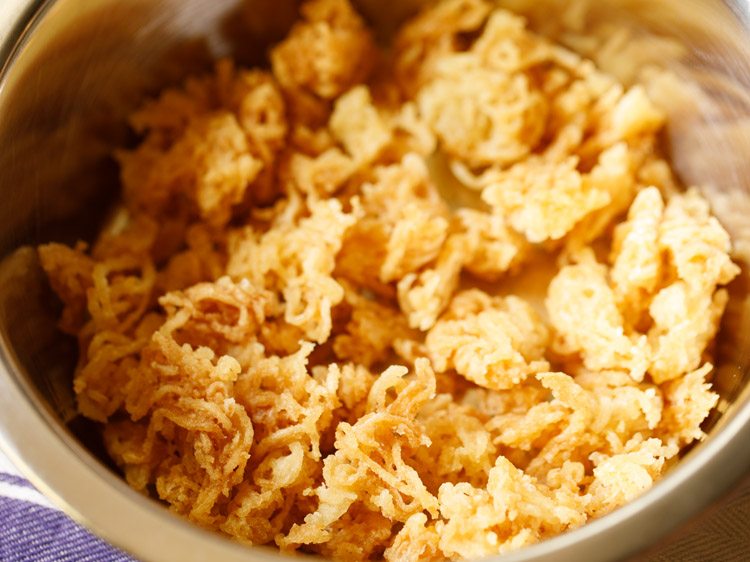
33. Then, add the stir fried vegetable mixture.
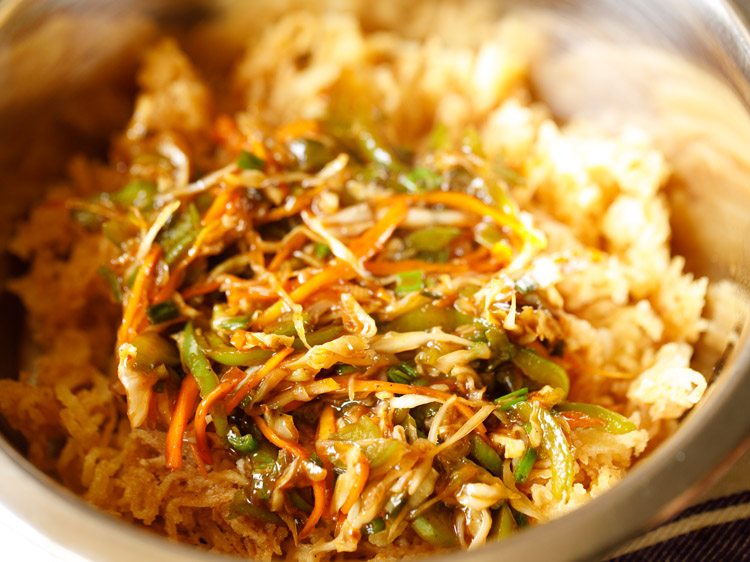
34. Next, add ¼ cup finely chopped tomatoes and 2 tablespoons roasted peanuts.
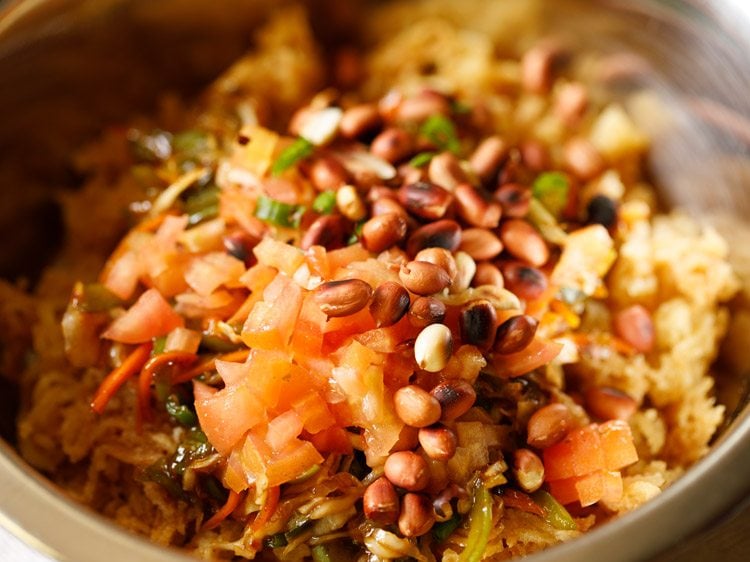
35. Sprinkle ¼ teaspoon chaat masala and 2 to 3 pinches black salt.
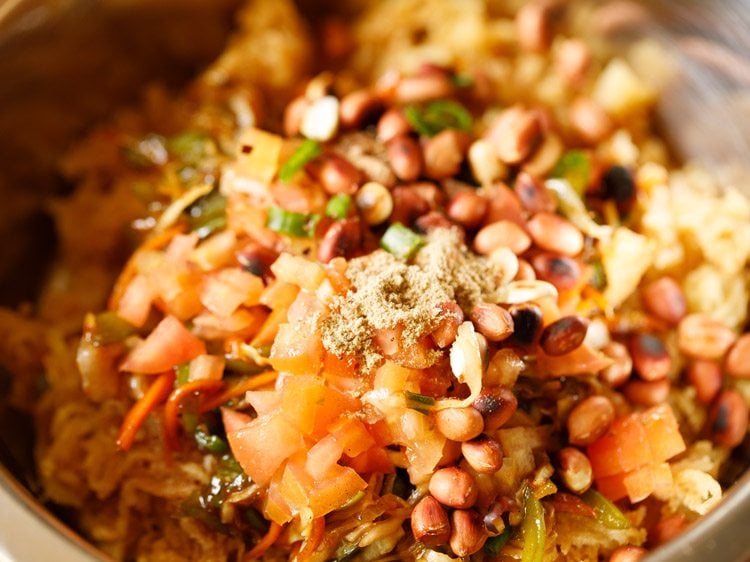
36. Add 1 tablespoon chopped coriander leaves and 1 tablespoon chopped spring onion greens. At this step, you can also drizzle a bit of lemon or lime juice.
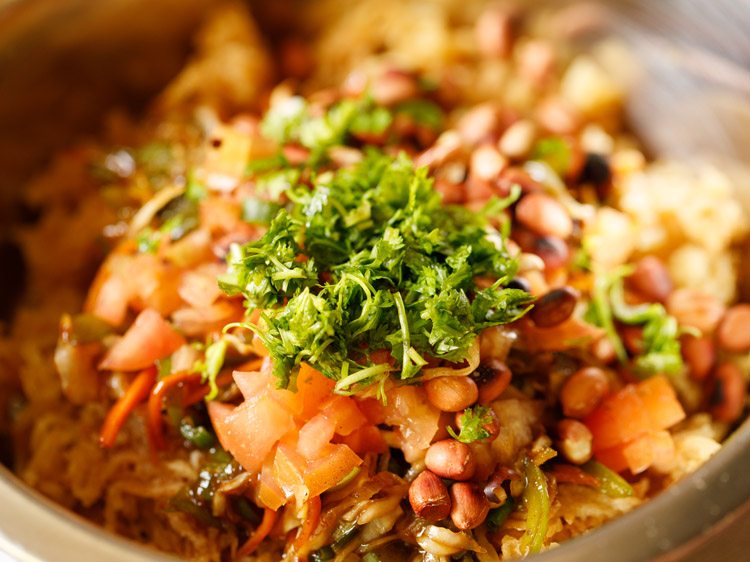
37. Mix very well.
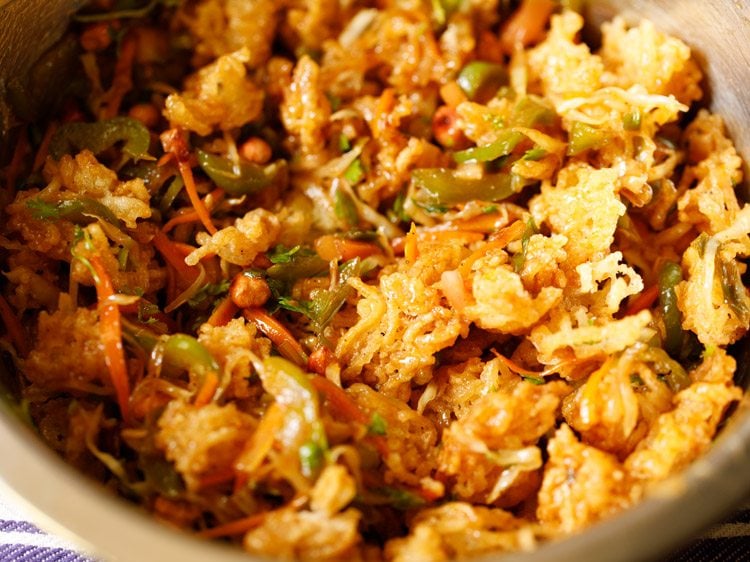
38. Serve Chinese Bhel right away garnished with some chopped coriander leaves and spring onion greens.
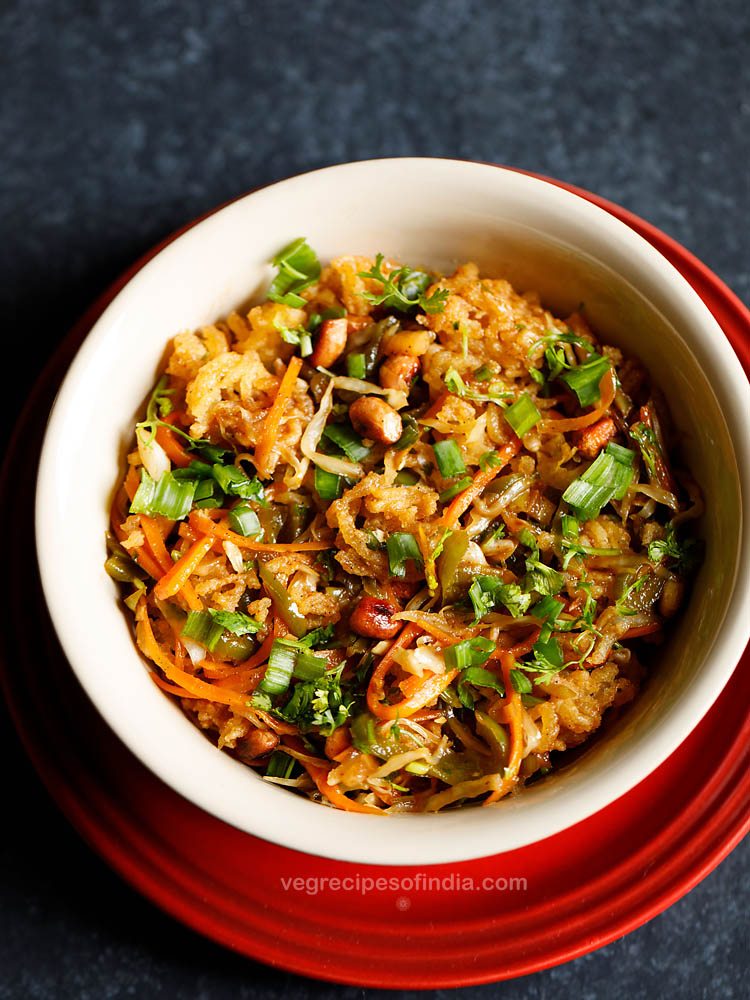
Expert Tips
- For the noodles, you can use your preferred choice of noodles – instant, all-purpose flour, whole wheat or Hakka noodles.
- Make sure to cook the noodles to an al dente. That is, the noodle strands should have a bite to them and not completely cooked.
- Remember to cool the noodles completely before you fry them. Also do add cornstarch to them and mix it evenly with the cooked cooled noodles.
- To shred or finely chop the vegetables, you can even use a food processor to fasten the process. Or else if you have time in hand, then you can use a knife too.
- In place of sriracha sauce, you can use red chili sauce or green chili sauce; in place of sweet tamarind chutney, you can use tomato ketchup.
- While adding coriander leaves and spring onion greens at the end, you can also add some lemon or lime juice in the bhel.
More Noodles Recipes To Try!
Indo Chinese Recipes
Indo Chinese Recipes
Indo Chinese Recipes
World Recipes
Please be sure to rate the recipe in the recipe card or leave a comment below if you have made it. For more vegetarian inspirations, Sign Up for my emails or follow me on Instagram, Youtube, Facebook, Pinterest or Twitter.
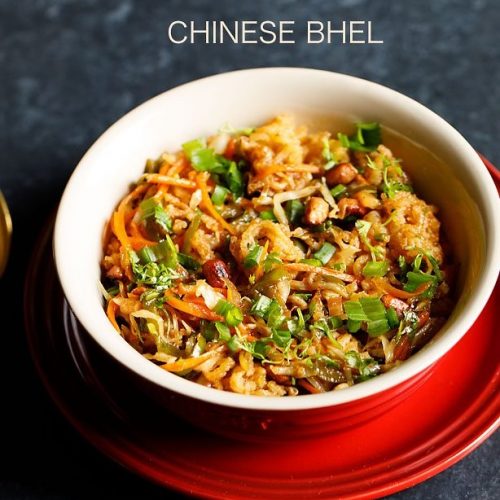
Chinese Bhel Recipe (Street Style)
Ingredients
For frying noodles
- 75 grams noodles (hakka noodles, instant noodles or whole wheat noodles) or 2 cups fried noodles
- ⅓ teaspoon salt or add as required
- 3 cups water for cooking noodles
- 1.5 tablespoons cornflour (cornstarch)
- oil as required, for deep frying noodles
For stir frying veggies
- 2 teaspoons oil
- ½ cup cabbage – shredded
- ⅓ cup carrots – shredded
- ⅓ cup capsicum – thinly sliced
- ¼ cup spring onions – chopped
- 1 tablespoon sriracha sauce or red chilli sauce or green chili sauce
- 2 tablespoons Tamarind Chutney or tomato ketchup
- ½ tablespoon soy sauce (naturally fermented or naturally brewed)
- salt as required
- ¼ teaspoon black pepper powder
- 2 tablespoons spring onion greens – chopped
Other ingredients
- ¼ cup tomatoes – finely chopped
- 2 tablespoons peanuts – roasted
- ¼ teaspoon chaat masala
- 2 to 3 pinches black salt or add regular salt
- 1 tablespoon coriander leaves – chopped
- 1 tablespoon spring onion greens – chopped
- ¼ to ½ teaspoon lemon juice or as needed, optional
For garnish
- 1 tablespoon spring onion greens – chopped
- 1 tablespoon coriander leaves – chopped
Instructions
Boiling noodles
- Heat 3 cups water together with ⅓ teaspoon salt and 2 to 3 drops of oil in a sauce pan on a medium to high heat.
- Let the water come to a rolling boil.
- Lower the heat and add the noodles. With a fork or a spoon press the noodles in the boiling water.
- Cook noodles on a medium heat till they become al dente.
- Check and taste a few noodle strands and they should have a slight bite to them. They should not be completely cooked.
- Strain the noodles in a colander or strainer.
- Then rinse the cooked noodles very well with fresh water. Use a spoon or fork to stir when rinsing noodles.
- Remove the noodles in a large plate or tray. Spread them evenly. Let noodles cool at room temperature for 1.5 to 2 hours. Later after 1.5 to 2 hours you can begin to deep fry them.
- Before frying add 1.5 tablespoons cornflour (cornstarch) on the cooled noodles.
- Mix very well so that the corn flour (corn starch) coats the noodles well. You can use a pasta or noodle tong to mix.
Frying noodles
- Heat oil for deep frying in a kadai or a pan.
- Add a few strands of the noodles and if they come up steadily and gradually then you can begin to fry them. If they settle down at the bottom, the oil needs to get hot. If they come up too quickly then the oil is very hot, so the heat need to be reduced.
- Add noodles in batches. As soon as you add noodles, then with a slotted spoon separate them.
- Fry till the base become light golden and crisp.
- Then turn over and fry the second side till crisp and light golden.
- Turn over a couple of times and fry till the noodles become golden.
- Remove fried noodles with a slotted spoon draining excess oil in the wok or pan.
- Place fried noodles on kitchen paper towels so that extra oil is absorbed. This way fry the noodles in batches.
- Once cooled, then place the crispy fried noodles in an air-tight container.
Stir frying vegetables
- Shred or finely chop the veggies. You can use a food processor or chop the veggies with a knife.
- Heat 2 teaspoons oil in a small wok or pan. Keep the heat to low to medium. Add ¼ cup chopped spring onions.
- Sauté for a minute.
- Then add ½ cup shredded cabbage, ⅓ cup shredded carrots and ⅓ cup thinly sliced capsicum. Mix well.
- Stir fry on medium to high heat for 4 to 5 minutes. Ensure not to overdo the veggies. A slight bite in them is preferable.
- Lower the heat and then add 1 tablespoon sriracha sauce (or red chilli sauce or green chili sauce), 2 tablespoons sweet tamarind chutney (or tomato ketchup) and ½ tablespoon soy sauce (naturally fermented).
- Mix very well.
- Season with ¼ teaspoon black pepper powder and salt as per taste.
- Mix very well and turn off the heat.
- Add 2 tablespoons chopped spring onion greens and mix again.
Assembling and making chinese bhel
- In a mixing bowl take the fried noodles. Break the noodles.
- Then add all of the stir fried veggie mixture.
- Next add ¼ cup finely chopped tomatoes and 2 tablespoons roasted peanuts.
- Sprinkle ¼ teaspoon chaat masala and 2 to 3 pinches black salt.
- Add 1 tablespoon chopped coriander leaves and 1 tablespoon chopped spring onion greens. At this step you can also drizzle a bit of lemon or lime juice.
- Mix very well.
- Serve Chinese Bhel right away garnished with some chopped coriander leaves and spring onion greens.
Notes
- You can make the Chinese Bhel with instant noodles, all-purpose flour, whole wheat or Hakka noodles.
- Make sure to cook the noodles to an al dente texture. That is, the noodle strands should have a bite to them and must not be completely cooked.
- Remember to cool the noodles completely before you fry them. Also do add cornstarch to them and mix it evenly with the cooked cooled noodles.
- To shred or finely chop the vegetables, you can opt to use a food processor to fasten the process. Or else if you have time on hand, then you can use a knife too.
- Swap sriracha sauce, with a spicy red chili sauce or green chili sauce. And in place of sweet tamarind chutney, you can use tomato ketchup.
Nutrition Info (Approximate Values)
This Chinese Bhel recipe from the blog archives first published in November 2017 has been updated and republished on May 2023.
